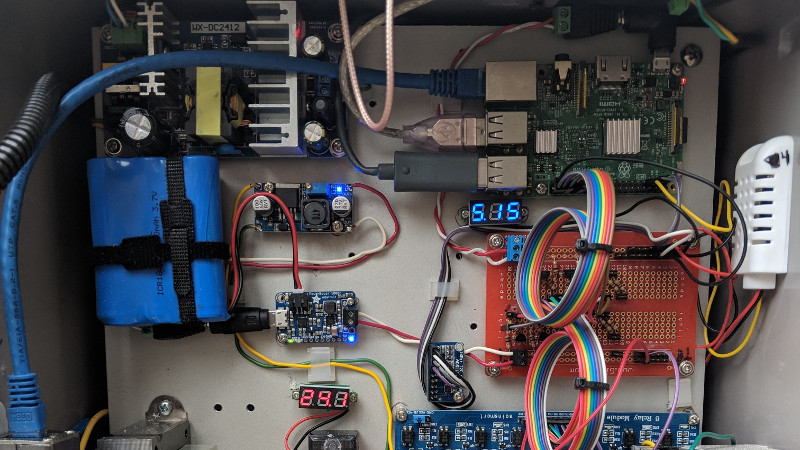Far from being a tiled hole in the ground with a bit of water in it, a modern swimming pool boasts a complex array of subsystems designed to ensure your morning dip is as perfect as that you’d find on the sun-kissed beaches of your dream tropical isle. And as you might expect with such complex pieces of equipment in a domestic setting, they grow old, go wrong, and are expensive to fix.
[DrewBeer]’s pool had just such a problem. A decades-oldwired controller had failed, so rather than stump up a fortune for a refit, he created his own pool controller which exists under the watchful eye of a Raspberry Pi. The breadth of functionality is apparent from his write-up. In addition to the pump and heater you’d expect, he as a salt water system, environmental monitoring, and even an RTL-SDR to pull in readings from an RF floating temperature probe. It’s all exposed via a node.js API, and thus far has been running for over 6 months without mishap.
From where this is being written in the gloom of a damp November in a Northern Hemisphere maritime climate we can only envy [Drew] his pool and imagine it as perpetually deep blue and sparkling, invitingly cool against the heat of a summer’s day. If you have similar pool automation woes. perhaps you’d also like to look at this ESP8266 pool monitor, or another automation project using a Raspberry Pi.
















That is an awful lot of electricity for such a simple task.
Angry pixies are cheap these days.
Hater
Heh angry pixies. Haven’t heard that one before. Love it.
Compared to the power usage of the salt system, heater, and pump this controller would be a rounding error.
Had a pool once in a rental property I was leasing. Never again unless I owned the house and I could do something like this with a solar power and heating systems to run it with.
Arduino wasn’t used for a few reasons. i needed to run the node-js pool software, since i didn’t want to rewrite all that pump logic (it’s not pretty), along with the rtl_433 package too.
He used a raspberry pi so he wouldn’t be like those Arduino poseurs.
The Pi probably has enough power leftover to run an entertainment system, at the least a sound system with a huge song library.
Or at least a ring of neopixels around the perimeter of the pool because.. ya know… Ya NEED that mood lighting.
(Pool jealousy)
So I’m new to this and very excited to learn about FreeRTOS. Am I missing any point why he couldn’t have used an Arduino and FreeRTOS?
I assume you have an electric saltwater chlorinator. Just wondering if you had to do anything special with the power to the electrodes to prevent a build-up on the plates? Like changing amps, cycling the polarity etc..
the salt chlorinator has a built in reverse polarity timer. i don’t recall what the timer does or how it switches, but it does. (its a breeze chlorinator.
Most salt cell controllers reverse polarity on the plates every 90 mins it is trying to generate chlorine. This helps it not build up scale as quickly. I doubt the SGS breeze is any differant (been out of the pool biz for over a year, but spent 12 years in it).
Wow, that’s allot of effort and money over simply taking a few drops of water in a $4.00 test kit that lasts all summer.
that seems a little disingenuous as his solution does a substantial bit more than testing the chemicals.
Pools have had automation system for the actual functioning equipment for a very long time. These cost $1000+ this is more like that then just testing the water. Great project.
Is that an UPS? What are the batteries doing?
“an UPS”? I’m curious—how do you pronounce “UPS”? It’s a topic that has seen its share of ups—and downs.
The blue module right above the red 7-segment display is an Adafruit combination lithium battery charger and 5v booster in one. So yes it’s a UPS.
It’s probably to provide a clean shutdown power source to the Pi, in the event the mains power dies.
Saltwater pool? WTF? Hard pass
It only has a little bit of salt. Just enough for the chlorine generator to do its thing.
You need one if you have a mermaid in the family
what is the issue with salt water pools? some people are sensitive to chemically treated pools and others just dont want the chemicals if they spend a lot of time in there.
While a saltwater pool does have a better swimming experience for some. It is just producing chlorine using the salt in the water. So chemicals are still used. Just not getting the byproducts or stabilizers from other chlorine sources. Those chemicals can build up and make it harder to care for the water.
you would be very surprised. no eye burning, softer water, softer skin, maintenance costs are much lower. most pools built nowadays is built with salt in mind.